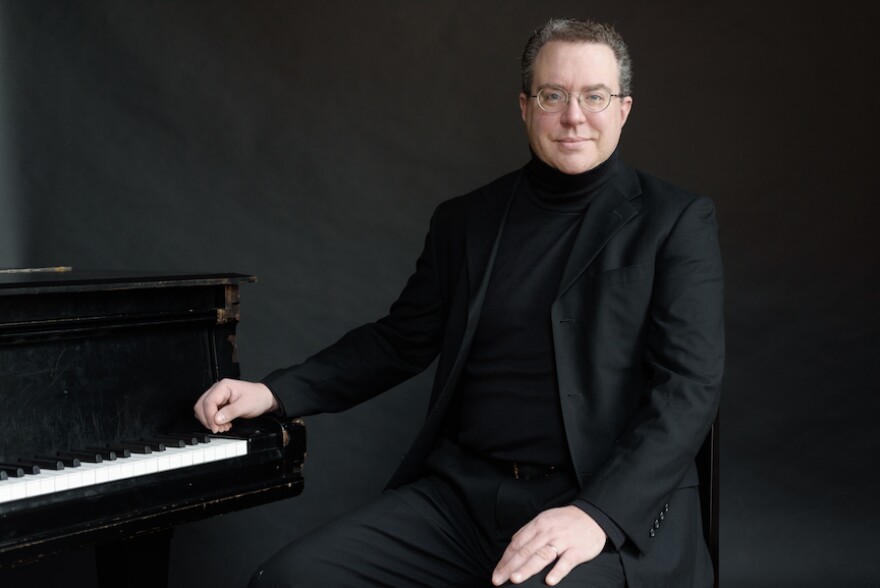Maine composer Aaron Robinson says he was 16 or 17 when started playing the piano and taught himself the "Maple Leaf Rag."
Ragtime is still a major musical interest for Robinson, who this Saturday night will stage a musical review in honor of a prolific Maine composer, the late Glenn Jenks, in Camden. Keith Shortall spoke with Robinson about his passion for ragtime, the foundation of so many other forms of American music.
Comfortably seated at a grand piano and a top floor studio of Bay Chamber Concerts in Rockport, Aaron Robinson recalls that 30 years ago, as a young pianist, he found himself in the audience at the Camden Opera House, mesmerized by the stylings of Glenn Jenks.
Robinson still preaches the historical importance of Ragtime, and he is eager to dispel what he believes may be a popular misperception:

Robinson: Many people think that Ragtime was written for the movies...but Ragtime was never played in the movies. It was played for dancing, and it is specifically derivative of the March, the European March and the Susa March, and it has a dual rhythm and the left hand with an oompa on top of it...Now what ragtime then went on to develop was the syncopated right hand melody on top of it. That's what gives it its distinct sound, the sound of Ragtime. Without one, you can't have the other.
Shortall: You're sort of personally interested in preserving and promoting and showcasing it. What is it about the music that intrigues you?
Well, it's never gone away. Out of all the styles of music over the decades, it's one that has remained. There was a Ragtime revival in the ‘70s with of course, the movie, The Sting. You can still hear Ragtime, even today. And Ragtime is the basis of all music that has come after: jazz, big band, rock and roll. All of that is the foundation from which Ragtime is. But Ragtime is such a happy music. It was the first music I ever heard -- that and church music. And I suppose when you think about Ragtime, you either play it, or you listen to it, because you want to be happy. It makes you happy.

There are no blue notes.
There are no blue notes in it...What the blues did, and jazz was throwing that seventh and Jelly Roll Morton in 1924 was the reason why we have that. So at the end of something like the Maple Leaf Rag of Scott Joplin
Talk about the tribute to Glenn Jenks. He died a few years ago. But you see him as an important cultural musical figure in Maine history. What did he give to us and what do you want to celebrate?

Glenn Jenks was one of Maine's great composers, not just of Ragtime works, but of orchestral, coral, etc. But with Ragtime, his music, his legacy, his library is unparalleled. Joplin wrote dozens and dozens of works -- not just rags, but waltzes, songs, an opera. And with Glenn, he left a legacy that no other composer has even come close to. He wrote 37 Ragtime pieces just for the panel alone. He wrote songs, he wrote a Ragtime concerto. And each one of the Ragtime pieces that he wrote is a masterpiece. Just like Joplin, he wrote waltzes, he wrote novelties, one steps, two steps, classic rags. …
Glenn developed the Ragtime sound. ...I think it is significant because it's still being played today. And most of the time when a composer writes things in modern day music, they have to play it themselves for it to be heard. When the music itself then takes a life of its own. You know, there's something there.
Maine composer Aaron Robinson is the producer of the first annual Glenn Jenks Ragtime Review at the Camden Opera House this Saturday, 30 years to the day from when Jenks himself launched his first Harvest Ragtime Review to a sold out crowd.
Originally published 6:40 p.m. Oct. 3, 2019



